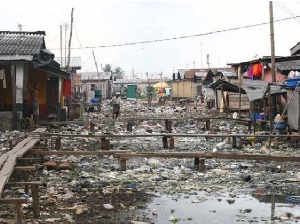 Some have attributed the cause to weak enforcement of by-laws
Some have attributed the cause to weak enforcement of by-laws
It is estimated that the country loses a total of GH¢1.440billion, equivalent to US$369million, annually as a result of poor sanitation and the menace of open defecation.
According to the World Bank, the cost was calculated taking into consideration factors such as health and medication bills, loss of tourism revenue, and loss of man-hours to illness and death emanating from poor sanitation and open defecation.
The situation, observers maintain, has manifested as a result of low prioritisation, inadequate financing, and poor implementation of policies and strategies meant to transform the sector.
Weak enforcement of laws and bye-laws, weak inter-sectorial coordination, and inability to scale-up tested models and approaches have also been cited as contributory factors to the problem.
The Technical Coordinator of Water, Sanitation and Hygiene (WASH) at World Vision International, Ghana, Attah Arhin, said the 2017/2018 Multiple Indicator Cluster Survey (MICS) revealed that 22% of the population – one out of every five Ghanaians – still practices open defecation.
This, he noted, has led to contamination of many drinking water-bodies across the country, thus causing devastating health problems; especially among children. He said close to eight (8) in every ten (ten) households had E-coli from faecal matter in their drinking water, while close to half of all water sources were affected.
“About 3,600 children die each year in Ghana from diarrhea and even more from pneumonia. Almost 23% of children in Ghana suffer from stunting-chronic malnutrition linked to poor water and sanitation. Improved sanitation can reduce diarrhea rates by 36%, but only 15% has access to improved sanitation,” he added.
Sanitation in basic schools, he observed, is nothing to write home about; and urged all stakeholders to roll up their sleeves to find an antidote for the health time-bomb in schools. Ghana achieved only 1% improvement in access to toilet facilities in public basic schools, and 2% retrogression in private basic schools (2013-2017), he said.
The Education Management Information System (EMIS 2017) indicates that 35% of the 21,438 public basic schools in the country do not have toilet facilities, while 1,631 out of the 9,064 private basic schools in Ghana also have no toilet facilities.
“If this trend continues, it will take the country another 150 years for all basic schools to have access to improved toilet facilities. Yet Ghana needs only US$147million to provide decent toilet facilities for all public basic schools in the country,” he added.
Mr. Arhin made these observations during a presentation on the overview of WASH in Ghana at a training workshop for media practitioners in Sunyani. The child protection and WASH media training was organised by the World Vision International in Ghana, in collaboration with the Ghana Journalists’ Association (GJA).
He underscored the need for a paradigm shift to WASH in order to aid the desired development, saying: “No strategy for poverty reduction can ignore people’s vital requirement for water and sanitation. WASH is fundamental for improved health, quality education, food security, income generation and socio-economic development”